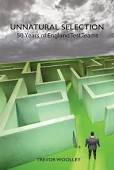Unnatural Selection
Martin Chandler |Published: 2015
Pages: 264
Author: Woolley, Trevor
Publisher: Von Krumm Publishing
Rating: 3.5 stars

As the Financial Director of the Ministry of Defence, and a civil servant for 36 years, author Trevor Woolley must have lost count of the number of committee meetings he has attended. So despite being a first time author with nothing more than a lifelong passion for the game by way of cricketing experience, I am quite happy to accept he is an ideal man to write a book on the sometimes unpredictable, occasionally inexplicable and invariably thought-provoking machinations of those groups of people responsible for the selection of the England Test team over the last half century.
In essence the book is a history of English Test cricket over a period which just happens to coincide almost exactly with my time as a cricketer follower, so pretty much the last fifty years. It is a subject on which there are plenty of books already, although none from the perspective that Woolley adopts, and none which seek to cover the entire period. The book is not however merely an exercise in repetition of already established facts and opinions with the odd new thought. It is a much more original concept than that.
Woolley begins with a look at the selection process itself, and how that has changed over the last fifty years. That said one not unreasonable conclusion might be that it remains pretty much the same, all developments being essentially cosmetic.
The main elements of the book follow and begin with an examination of the selectors’ preferences by role, so you have chapters on captains, batsmen, pace bowlers and spinners with a separate look at the role of wicketkeepers and all-rounders within a chapter entitled ‘Striking the Balance’. There are reminders of the occasional non-cricketing considerations that have got in the way of selectorial deliberation, but in the main Woolley dwells on the borderline decisions that caused debate at the time they were made. It is easily forgotten just how much difference it might have made to the result of some games if certain decisions had gone a different way, and therein lies what makes Unnatural Selection so interesting.
For a man whose working life was, presumably, ruled by numbers this is a well written and easy to read account. It also clearly fits within the labour of love category of writing projects and must have been in Woolley’s mind for a long time. One of his primary sources is Alec Bedser, who passed away five years ago. Bedser’s length of service as a selector mean he was ideally placed to provide some new insights into some old stories, but it would have been contrary to his nature to do so. I can confirm from personal experience that Sir Alec was a man who was generous with his time, but also distinctly guarded when asked about anything sensitive.
Woolley also spoke to Doug Insole, although he found him no more forthcoming over his pivotal involvement in the ‘D’Oliveira Affair’ than anyone else has. Interviewed too were Mickey Stewart and Ted Dexter. The former was involved for many years at the heart of the selection process and in his time was a fringe player who might have had more breaks from the selectors. As for Lord Ted he was an England captain as well as Chairman of Selectors so another well qualified to speak, although his famous inability on one occasion to correctly name one of his team does call into question his reliability as a historian.
The slight disappointment with Unnatural Selection is that, John Hampshire apart, Woolley has not been able to tease anything out of those who were the beneficiaries of the selectors’ largesse or, alternatively, victims of their caprice. Some, like Chris Cowdrey, probably fit both descriptions, but there are plenty of candidates and in fact, I suppose, it might be argued too many. But despite that this is a still a book well worth reading and Trevor Woolley has every right to take pride in his first book.






Leave a comment